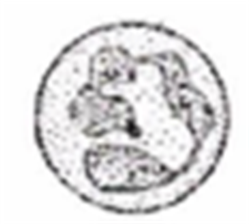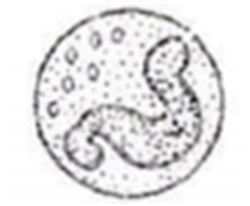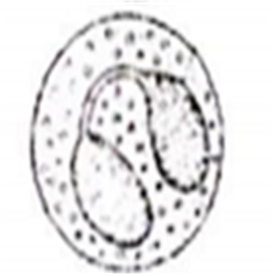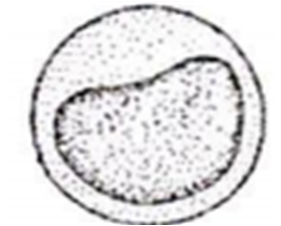 Multiple Choice Questions
Multiple Choice QuestionsSelect the correct pair amongst the following
Spring wood- light colour, high density
Spring wood - dark colour, low density
Autumn wood - light colour, high density
Autumn wood - dark colour, high density
D.
Autumn wood - dark colour, high density
The wood formed in a single year consists of two types of wood, spring wood and autumn wood. Spring or early wood is much wider than the autumn or late wood. It is lighter in colour and of lower density. It consists of larger and wider xylem elements.
Autumn or late wood is dark coloured and of higher density. It consists of compactly arranged smaller and narrower elements which have thick walls. In this, tracheids and fibres are more abundant as compared to spring wood.
Which of the following organelles contain DNA?
(i) Mitochondria (ii) Chloroplasts (iii) Golgi bodies (iv) Ribosomes
(i) and (ii)
(ii) and (iii)
(i) only
(iv) only
Carbon dioxide (CO2) diffuses into blood from tissue site and passes to alveolar site in the form of
bicarbonate; 70%
bicarbonate; 20 - 25%
carbaminohaemoglobin; 60 - 70%
carbaminohaemoglobin; 7%
Select the option having all the correct characteristics.
| Structure | Percentage of WBCs | Function |
 |
0.3 - 0.5 | Phagocytic |
| Structure | Percentage of WBCs | Function |
 |
0.5 - 1.0 | Secrete histamine and serotonin |
| Structure | Percentage of WBCs | Function |
 |
30 - 40 | Defense against parasites |
| Structure | Percentage of WBCs | Function |
 |
30 - 40 | Allergic reactions |
Which of the following plant growth regulators (PGRs) promotes root initiation, flowering and induced parthenocarpy?
Gibberellin
Auxin
Cytokinin
Ethylene
Assertion : A mutual exchange of sperms occurs between two earthworms during mating.
Reason : Mature sperms and egg cells and nutritive fluid are deposited in cocoons produced by gland cells of clitellum.
If both assertion and reason are true and reason is the correct explanation of assertion.
If both assertion and reason are true but reason is not the correct explanation of assertion.
If assertion is true but reason is false.
If both assertion and reason are false.
Assertion : On plotting the length of the root against time, a linear curve is obtained.
Reason : An elongating rout exemplifies arithmetic growth.
If both assertion and reason are true and reason is the correct explanation of assertion.
If both assertion and reason are hue but reason is not the correct explanation of assertion.
If assertion is true but reason is false.
If both assertion and reason are false.
Assertion : Small intestine is the principal organ for absorption of nutrients.
Reason : Absorption of water, simple sugars and alcohol etc. takes place in small intestine.
If both assertion and reason are true and reason is the correct explanation of assertion.
If both assertion and reason are hue but reason is not the correct explanation of assertion.
If assertion is true but reason is false.
If both assertion and reason are false.
Assertion: On touching radial artery in our wrist, we feel pulse waves.
Reason : The heart beats originate from the sinoatrial node (SA node) on the right atrium.
If both assertion and reason are true and reason is the correct explanation of assertion.
If both assertion and reason are hue but reason is not the correct explanation of assertion.
If assertion is true but reason is false.
If both assertion and reason are false.
Assertion : Protostele is the simplest stele.
Reason : Protostele is the most advanced type of stele.
If both assertion and reason are true and reason is the correct explanation of assertion.
If both assertion and reason are true but reason is not the correct explanation of assertion.
If assertion is true but reason is false.
If both assertion and reason are false.
